This piece was originally published in the June 10, 2021 edition of CAP Action’s weekly newsletter, What’s Trending? Subscribe to What’s Trending? here.

Hey, y’all.
This week, instead of doing a topical deep dive, we’re going to examine different types of engagement (shares, comments, and reactions) and whether those behaviors differ for the audiences of progressive and conservative Facebook pages.
But first! Did you miss last week’s edition of What’s Trending? Don’t worry — you can read it here.
WHAT’S TRENDING THIS WEEK
- Tax Evasion: ProPublica released a new analysis, “The Secret IRS Files,” which found that between 2014–2018, the richest 25 Americans paid little to nothing in federal income taxes. The report explores how the ultrarich avoid paying their fair share while middle-class Americans foot the bill, renewing calls to pass President Biden’s tax plans. Public Citizen also documents how those same companies spent almost half a billion dollars on lobbying and political efforts.
- First trip abroad: On Wednesday, President Biden departed for his first trip abroad since taking office, aiming to showcase that the United States is back and standing with other democracies of the world to tackle global challenges together. Under Biden, global approval of the United States has rebounded.
WHAT WE’RE HEARING ON SOCIAL
Progressives and conservatives continue to post about a wide-range of topics on Facebook. This past week, conservatives posted anti-LGBTQ content, anti-immigrant content, and their top post was a video of a speech accusing President Biden of “trying to turn this country into a socialist hell hole.”
On the left, Michelle Obama’s Facebook page continues to outperform the rest of the field. She published the top post of the week, celebrating fellow FLOTUS Dr. Jill Biden’s birthday. Other top-performing posts included values statements, highlights of international trips by the president and vice president, and a commemoration of the life of Breonna Taylor.
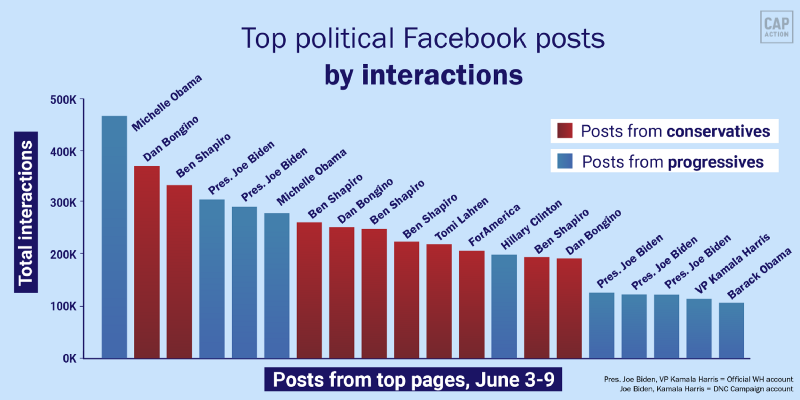 Top 20 best-performing political Facebook posts by interactions, according to data from NewsWhip.
Top 20 best-performing political Facebook posts by interactions, according to data from NewsWhip.
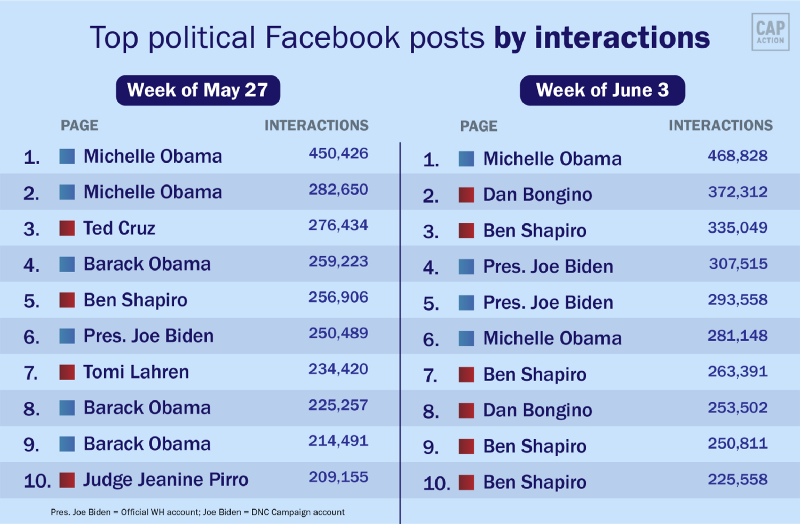 Top 10 best-performing political Facebook posts on the left and right for the weeks of May 27 and June 3 by interactions, according to data from NewsWhip.
Top 10 best-performing political Facebook posts on the left and right for the weeks of May 27 and June 3 by interactions, according to data from NewsWhip.
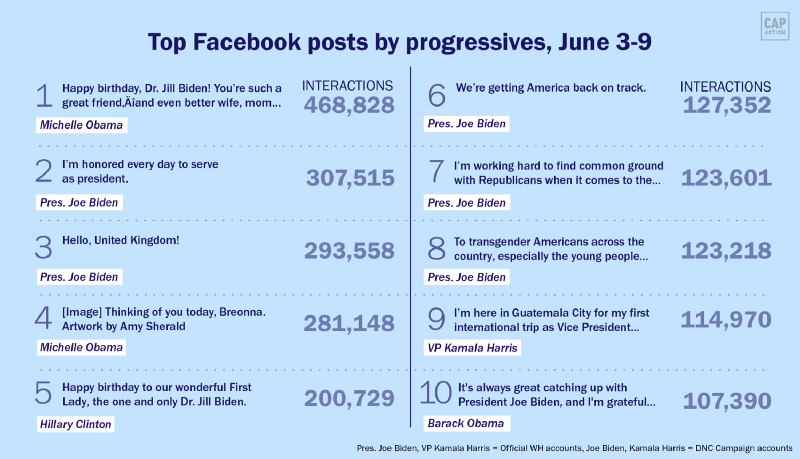 Top ten Facebook posts from progressive pages over the last week, according to data from NewsWhip.
Top ten Facebook posts from progressive pages over the last week, according to data from NewsWhip.
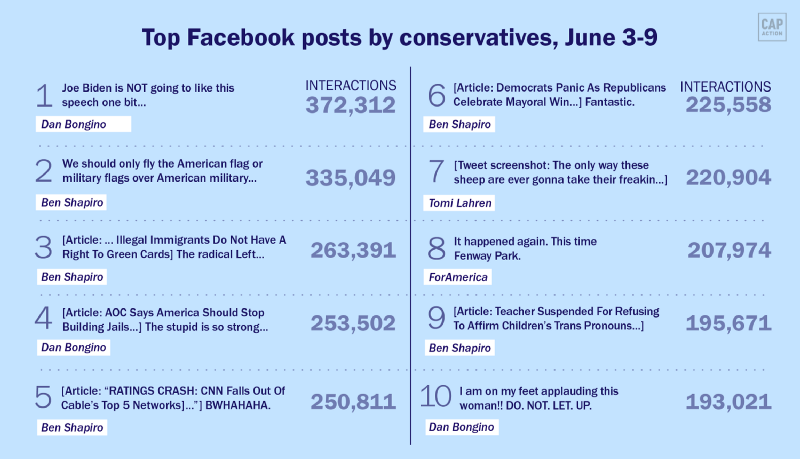 Top ten Facebook posts from conservative pages over the last week, according to data from NewsWhip.
Top ten Facebook posts from conservative pages over the last week, according to data from NewsWhip.
President Biden and Donald Trump’s names continue to outperform every other group of issue-related keywords. We did see a noticeable upward shift in the performance of content about COVID-19, due in part to high-performing posts from UNICEF, which are boosted by the platform’s COVID-19 information panel. We saw a slight increase in conversation about electoral reform on June 6, which is likely due to reaction to Sen. Manchin’s op-ed about voting against the For the People Act.
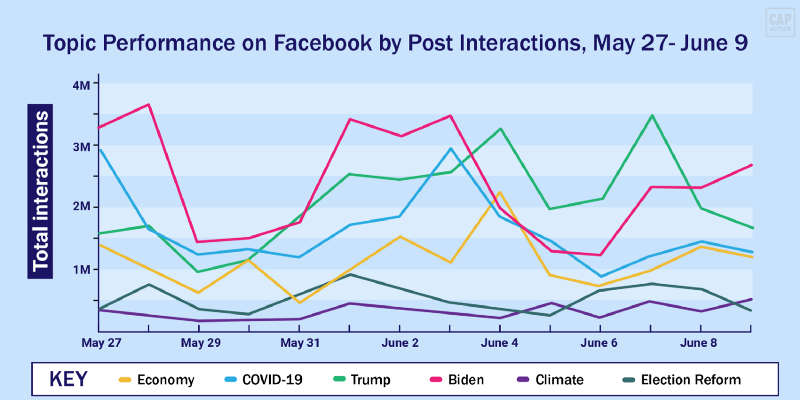 Total daily interactions (U.S. only) with Facebook posts matching topic keywords, according to data from NewsWhip.
Total daily interactions (U.S. only) with Facebook posts matching topic keywords, according to data from NewsWhip.
As I mentioned earlier, instead of diving into a specific policy issue this week, we’re going to examine something a bit more tactical: different types of engagement — shares, comments, and reactions — and whether those behaviors differ for the audiences of progressive and conservative Facebook pages.
For months we’ve watched conservative Facebook pages control the Facebook engagement battle. It’s not that there aren’t progressive pages with large audiences and good content. Here’s a fact that may surprise you: The average progressive post got more reactions than the average conservative post.
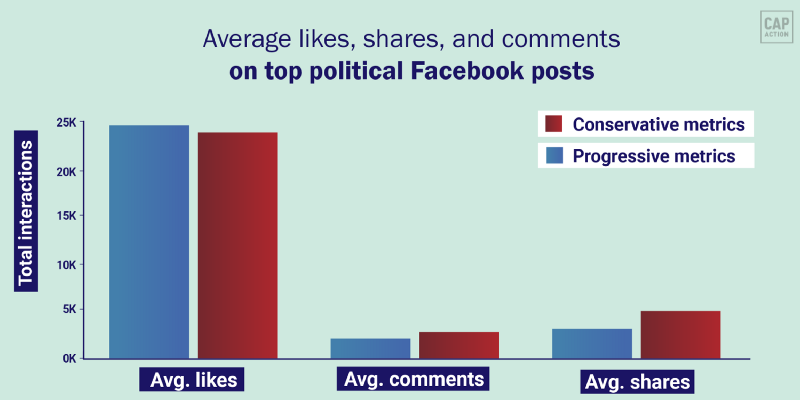 Average likes, shares, and comments on top political Facebook posts (U.S. only) for the week of June 3–9, according to data from NewsWhip.
Average likes, shares, and comments on top political Facebook posts (U.S. only) for the week of June 3–9, according to data from NewsWhip.
But conservatives manage more pages with large followings, and they publish more content than progressives. Of the top 1,000 political posts by interactions this week, 711 were from conservative pages.
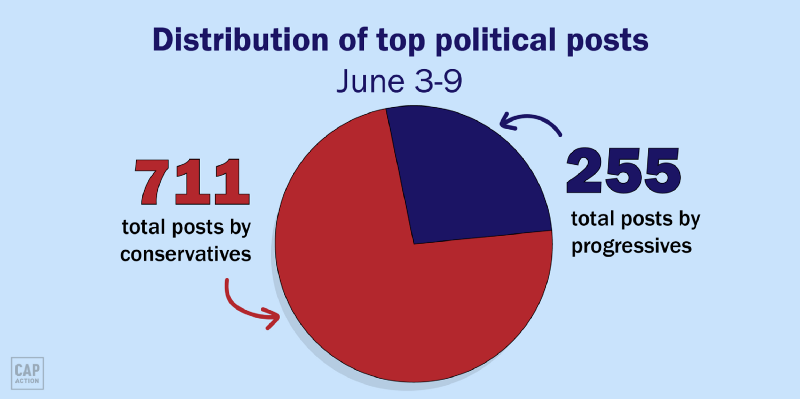 Distribution of top 1000 political Facebook posts (U.S. only) for the week of June 3–9, according to data from NewsWhip. Neutral (neither progressive nor conservative) political pages were omitted.
Distribution of top 1000 political Facebook posts (U.S. only) for the week of June 3–9, according to data from NewsWhip. Neutral (neither progressive nor conservative) political pages were omitted.
Conservative pages also get way more high-value engagement per post — both in comments and, most importantly, shares. These actions require more from the viewer than a simple reaction, and due to the Facebook algorithm’s favor toward them, they boost a post’s total reach significantly.
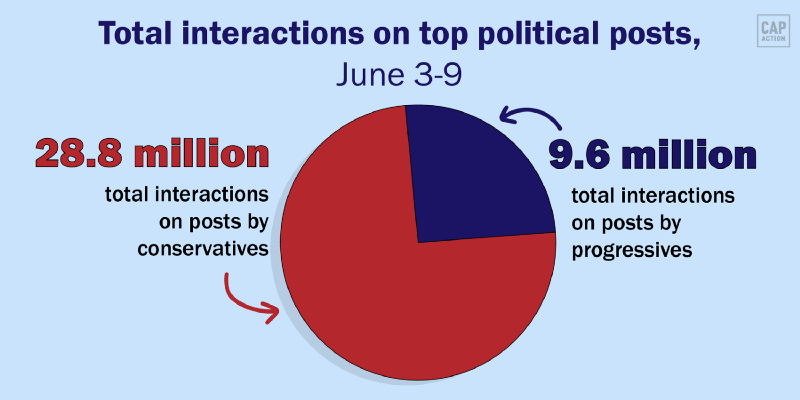 Total interactions on top political Facebook posts (U.S. only) for the week of June 3–9, according to data from NewsWhip.
Total interactions on top political Facebook posts (U.S. only) for the week of June 3–9, according to data from NewsWhip.
- Saturday, June 16, is the five-year anniversary of the Pulse nightclub shooting. Share the stories of the 49 we lost, take a virtual tour of the interim memorial, and/or make a donation to the One Pulse Foundation (@onePULSEorg).
Thanks for reading,
Alex
P.S. Please do forward along to your friends who are interested or encourage them to sign up here.
This newsletter is written by me, Alex Witt (@alexandriajwitt), a progressive political strategist and Dolly Parton enthusiast (she/her). I’ve managed social media programs for presidential candidates, political committees, progressive advocacy organizations, and more.